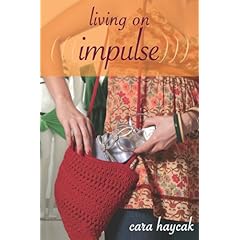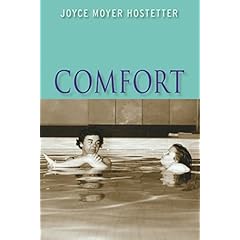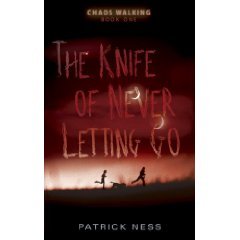I’ve read eighty some-odd of the books nominated for the Cybils Middle Grade Fiction Award, and although I enjoyed the experience immensely, I’m ready to move on to fiction about and for some other age group. So I’ve been sampling the nominees on the YA fiction list and some other YA fiction published in 2009.
 Living on Impulse by Cara Haycak. Mia’s impulsive nature leads her to shoplift, go clubbing, try out alcohol, and generally make a mess of her life. The book sees to imply that all teens have to go through a stupid decisions phase before they can become truly mature, but I’m not sure I believe that. Mia is also the child of an alcoholic mother and an unknown father, and those liabilities factor into her poor decision-making skills. Still, Ms. Hayak tells a good story, and Mia is an interesting character.
Living on Impulse by Cara Haycak. Mia’s impulsive nature leads her to shoplift, go clubbing, try out alcohol, and generally make a mess of her life. The book sees to imply that all teens have to go through a stupid decisions phase before they can become truly mature, but I’m not sure I believe that. Mia is also the child of an alcoholic mother and an unknown father, and those liabilities factor into her poor decision-making skills. Still, Ms. Hayak tells a good story, and Mia is an interesting character.
Other reviews: Liz at Tea Cozy, Serenehours.
 After the Moment by Garrett Freyman-Weyr. Female author tries to tell the story of a young man’s first love form the male point of view. I think she does a fairly good job, but then, what would I know about it? Leigh is seventeen, and he’s a people-pleaser. Maia is sixteen, and she’s a “cutter, self-mutilator, anorexic, crazy, anxious, drunk girl.” They fall in love. Something bad happens to Maia, and Leigh does the wrong thing in response to her crisis.
After the Moment by Garrett Freyman-Weyr. Female author tries to tell the story of a young man’s first love form the male point of view. I think she does a fairly good job, but then, what would I know about it? Leigh is seventeen, and he’s a people-pleaser. Maia is sixteen, and she’s a “cutter, self-mutilator, anorexic, crazy, anxious, drunk girl.” They fall in love. Something bad happens to Maia, and Leigh does the wrong thing in response to her crisis.
I don’t know if it’s because they’re part of the Eastern prep school tradition or just that they’re out of my cultural milieu, but Maia, and especially Leigh, think and act in ways that just felt odd to me. Small example: “For the first time, zoning out with soccer failed him, forcing Leigh to turn his attention back to the war.” What? The only possible things to occupy Leigh’s attention are soccer and the Iraq War? The author made a big deal about how the war doesn’t really touch Leigh’s life, how he is insulated by background and privileged status from the war, and yet the only thing he can find to occupy his attention is Iraq? Just one example, but these people didn’t feel real to me. I couldn’t figure out why they acted as they acted. Still, I kept trying because the author did make me care what would happen to them.
Other reviews: Harmony Book Reviews, A Striped Armchair, Bart’s Bookshelf, Steph Su Reads.
 Going Bovine by Libba Bray. I only made it through about 200 pages of this 480 page surreal adventure about a self-centered jerk named Cameron who has mad cow disease and goes on a road trip to save the world and find a cure. I gave up around the time we got to Mardi Gras in New Orleans. I take it back; I kept reading and actually liked the part about the Happiness Cult. Then, when I got through rooting for one of the guys (Cameron picks up a sidekick midget named Gonzo) to take down the Happiness Cult, all I had left was the simulation of a bad acid trip with Cameron and Gonzo. And Gonzo is only a little less jerky than Cameron. So, I gave up and turned to the last chapter. WARNING: I write spoilers for books I don’t like so that you don’t have to suffer through them: Cameron dies. I think.
Going Bovine by Libba Bray. I only made it through about 200 pages of this 480 page surreal adventure about a self-centered jerk named Cameron who has mad cow disease and goes on a road trip to save the world and find a cure. I gave up around the time we got to Mardi Gras in New Orleans. I take it back; I kept reading and actually liked the part about the Happiness Cult. Then, when I got through rooting for one of the guys (Cameron picks up a sidekick midget named Gonzo) to take down the Happiness Cult, all I had left was the simulation of a bad acid trip with Cameron and Gonzo. And Gonzo is only a little less jerky than Cameron. So, I gave up and turned to the last chapter. WARNING: I write spoilers for books I don’t like so that you don’t have to suffer through them: Cameron dies. I think.
All the other bloggers who loved, loved , loved this book: Em’s Bookshelf, The Book Reader, A Chair, a Fireplace, and a Tea Cozy, Mrs. Magoo Reads, Juicilicious. I could keep linking, but you get the idea. I’m the odd man out, and you can all go bovine together if you want. If it comes in parts, as my daddy used to say, you can leave mine out.
 Comfort by Joyce Hostetter. This sequel to Hostetter’s Blue, about a girl who is recovering from polio in the aftermath of World War II, suffered from the opposite problem from Going Bovine. Everyone in the novel, especially the young heroine, was so-o-o sincere, and patient, and understanding, and Good. The protagonist, Ann Fay, spends some time at Warm Springs Foundation in Georgia, and that section of the book felt like a fictional advertisement for the polio rehabilitation center. All of the “polios” are good, and happy, and dedicated to working hard to be rehabilitated. And I sound really snarky and condescending. Actually, I liked the book, and the part about Ann Fay’s daddy’s experiences with post -traumatic stress from the war was interesting and more believable. But overall the book was just a little too sweet and serious and humorless.
Comfort by Joyce Hostetter. This sequel to Hostetter’s Blue, about a girl who is recovering from polio in the aftermath of World War II, suffered from the opposite problem from Going Bovine. Everyone in the novel, especially the young heroine, was so-o-o sincere, and patient, and understanding, and Good. The protagonist, Ann Fay, spends some time at Warm Springs Foundation in Georgia, and that section of the book felt like a fictional advertisement for the polio rehabilitation center. All of the “polios” are good, and happy, and dedicated to working hard to be rehabilitated. And I sound really snarky and condescending. Actually, I liked the book, and the part about Ann Fay’s daddy’s experiences with post -traumatic stress from the war was interesting and more believable. But overall the book was just a little too sweet and serious and humorless.
 The Knife of Never Letting Go by Patrick Ness. This one was great —until I got to the end, which wasn’t an ending at all, just a “To be continued” cliff-hanger kind of ending. Chapters that end in cliff-hangers are O.K. I get the point which is to keep the pages turning. Books that end with lines like the following are annoying, even though I will read the sequel, published this year and entitled The Ask and the Answer. The ending of The Knife of Never Letting Go:
The Knife of Never Letting Go by Patrick Ness. This one was great —until I got to the end, which wasn’t an ending at all, just a “To be continued” cliff-hanger kind of ending. Chapters that end in cliff-hangers are O.K. I get the point which is to keep the pages turning. Books that end with lines like the following are annoying, even though I will read the sequel, published this year and entitled The Ask and the Answer. The ending of The Knife of Never Letting Go:
“I’m so sorry,” I whisper to her. “I’m so sorry.”
We’ve run right into a trap.
We’ve run right off the end of the world.
“Welcome,” says the Mayor, “to New Prentisstown.”End of Book One.
You can read more about the book (which was exciting and absorbing and quite violent) at: Becky’s Book Reviews, Presenting Lenore, Lazygal, Bib-Laura-graphy, or Things Mean a Lot.
So, this post turned out to be about the YA books that I thought were O.K., so-so, or really bad. I did find a couple of gems. Reviews of the really good ones coming soon.
Looking forward to the reviews of the really good ones!
Pingback: Sunday Salon: Books Read in January, 2010 | Semicolon